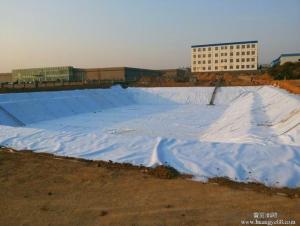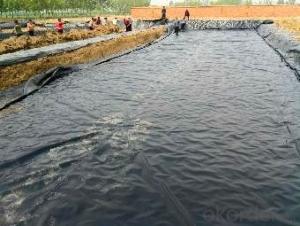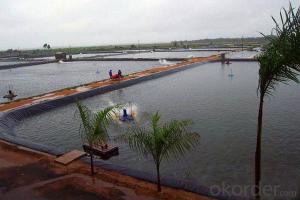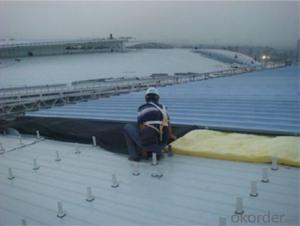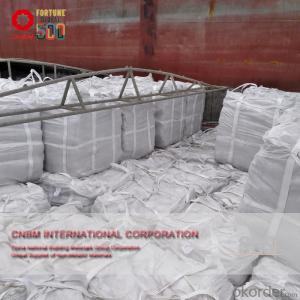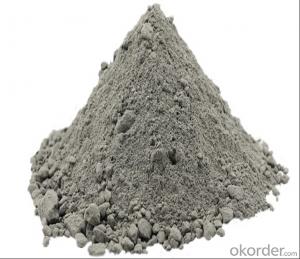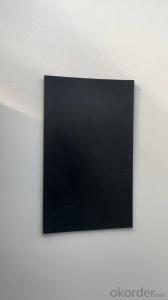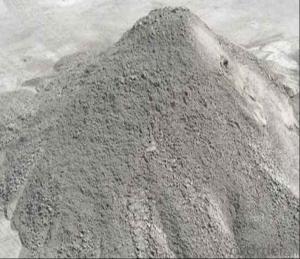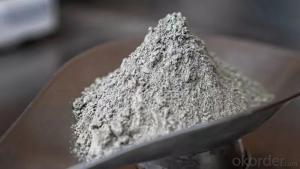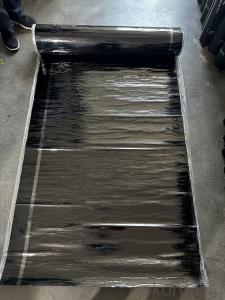1.0mm EPDM Self-adhesion Modified Bitumen Waterproof Membrane
- Loading Port:
- Qingdao
- Payment Terms:
- TT OR LC
- Min Order Qty:
- 10000 m²
- Supply Capability:
- 5000000 m²/month
OKorder Service Pledge
OKorder Financial Service
You Might Also Like
Description Of EPDM Self-adhesion Modified Bitumen Waterproof Membrane:
1. EPDM Self-adhesion Modified Bitumen Waterproof Membrane can only form into a "protective film" in ideal status, thus, commonly seen thorny problem would arise. Any defect in waterproofing layer can lead to fluid-channeling, which could further make larger area of waterproof layer even the whole lose efficacy. Obviously, in terms of waterproofing system, tackling the problem of fluid-channeling is the most convenient and effective way to solve leakage problems
Main Features of EPDM Self-adhesion Modified Bitumen Waterproof Membrane:
1. Self-adhesive without bonding agent and torching
2. With good elasticity and elongation, can be used in -25 degree weather.
3. Easy and safe installation, and won't be effected by the weather, greatly reduce the construction period and the cost.
4. Enviroenment protection product.
5. Corrosion resistance and ageing-resistance
6. Available for wet ground
Specifications of EPDM Self-adhesion Modified Bitumen Waterproof Membrane:
Type | EPDM Waterproof Membrane | |||
Material | EPDM Rubber | |||
Thickness | 1.0mm | 1.2mm | 1.5mm | 2.0mm |
Size | 1.2m(width) * 20m(length)/roll | |||
Type | Vulcanized | |||
Pattern | Non-reinforced(homogeneous) | |||
Packing | 24sqm--80sqm/roll, with plastic bag | |||
Color | Black | |||
Application | Roofs, basement, pond, Lake, steel structure roof, swimming pool, underground, tunnel, etc | |||
Applications of EPDM Self-adhesion Modified Bitumen Waterproof Membrane:
1.Environmental protection, sanitation (such as landfill, waste water treatment, toxic and harmful chemicals disposal sites, storage of dangerous goods , industrial waste, construction and demolition waste, etc.
2. Water ,such as impervious, stop water loss, and reinforcing of lakes, and the impervious, slope protection, etc.
3. Municipal projects (underground subway, engineering underground and reservoirs on the roof, and the park on the roof, the lining in the sewage pipes, etc.)
4. Garden (artificial lakes, ponds, the lining of tank in golf course, slope protection, etc.)
5. Petrochemical(chemical plants, oil refineries, oil tank of fill stations , chemical reactions pound, the lining of settling basin, second lining, etc.)
IMages of EPDM Self-adhesion Modified Bitumen Waterproof Membrane:
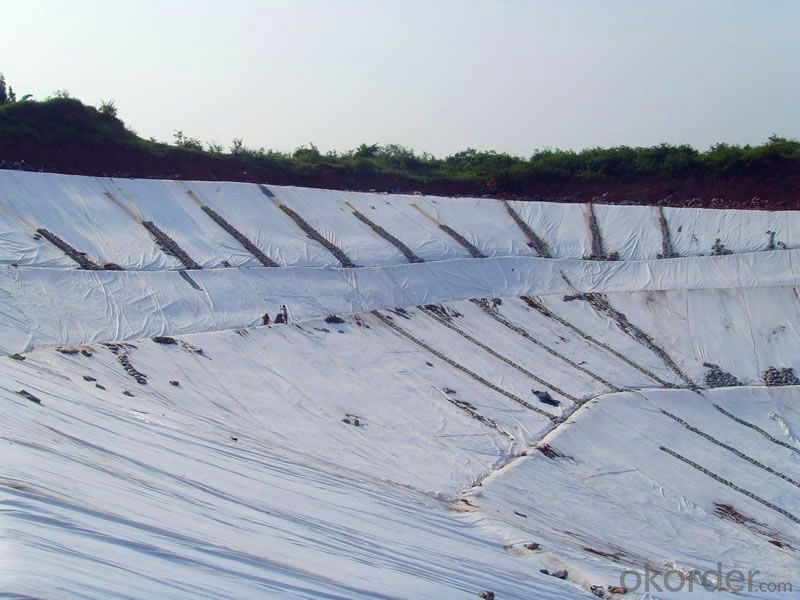
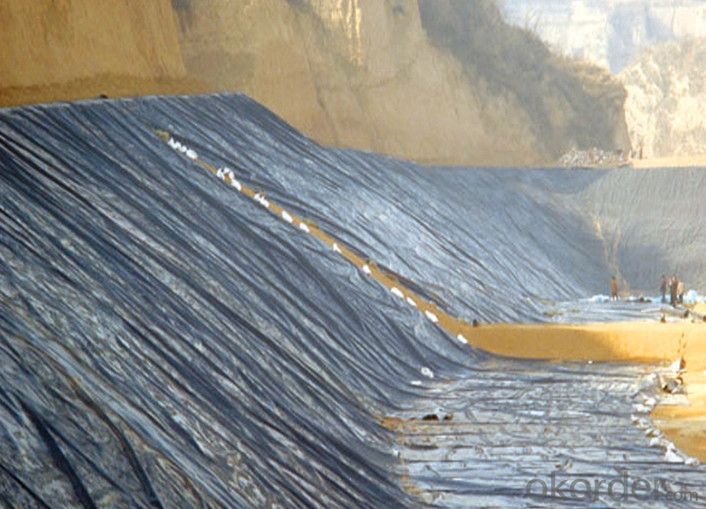
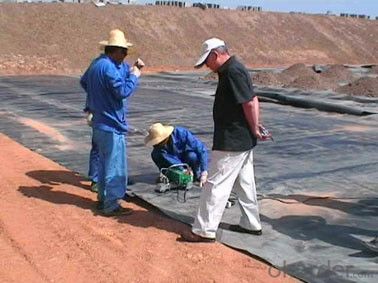
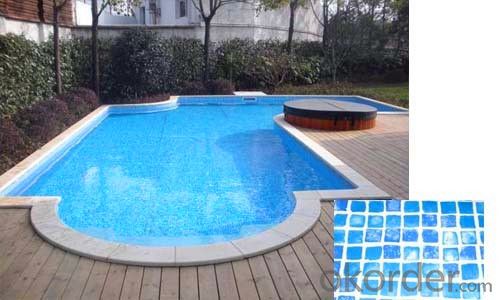
FAQ:
Q1.:What are we supplying?
A1:We are specialized in producing Colorful Asphalt Roof Shingle, SBS/APP modified bitumen waterproof membrane, Self adhesive bitumen waterproof membrane, PVC waterproofing membrane, EPDM rubber roofing membrane, Single Component Polyurethane Waterproof Coating, and Spray Polyurea Waterproof Coating
.
Q2: How Many years experience do we have?
A2:We have exported to more than 20 countries in the last 15 years.
Q3.:Do you provide samples for us?
A3:Yes,We will provide samples for free.Waiting for your your good news.
- Q:Can a waterproofing membrane be used on zinc surfaces?
- Yes, a waterproofing membrane can be used on zinc surfaces. Zinc is a durable and corrosion-resistant material, and a waterproofing membrane can provide an additional layer of protection against water infiltration, ensuring the longevity and integrity of the zinc surface.
- Q:Can waterproofing membranes be used in cold climates?
- Waterproofing membranes are applicable in cold climates. They are specially engineered to safeguard against moisture and water infiltration in diverse weather situations, including cold temperatures. These membranes are commonly constructed from sturdy and pliable materials that can endure freezing temperatures without fracturing or declining in quality. Furthermore, certain waterproofing membranes incorporate supplementary characteristics such as thermal insulation, which aids in preventing heat loss and upholding a cozy indoor atmosphere in cold climates. All in all, waterproofing membranes serve as a successful remedy for guaranteeing the soundness and durability of structures in cold weather circumstances.
- Q:Where are waterproofing membranes commonly used?
- Waterproofing membranes are commonly used in construction, particularly in areas such as basements, roofs, foundations, and bathrooms, where protection against water infiltration and moisture is crucial.
- Q:Can a waterproofing membrane be applied in cold weather conditions?
- Yes, a waterproofing membrane can be applied in cold weather conditions. However, it is important to note that the specific temperature range in which it can be applied may vary depending on the product and manufacturer guidelines. Some waterproofing membranes are designed to withstand cold temperatures and can be applied as low as -20 degrees Celsius (-4 degrees Fahrenheit), while others may have a higher minimum application temperature. It is crucial to follow the instructions provided by the manufacturer and ensure that the surface is properly prepared and free from any ice, snow, or moisture. Additionally, it is recommended to consult with a professional contractor who has experience working with waterproofing membranes in cold weather conditions to ensure the best results.
- Q:Can a waterproofing membrane be used on plastic block surfaces?
- Indeed, it is possible to utilize a waterproofing membrane on surfaces composed of plastic blocks. These membranes are specifically engineered to serve as a safeguard against moisture, effectively hindering water infiltration. Similar to any other type of surface, plastic blocks are prone to water-related harm if not adequately shielded. By applying a waterproofing membrane, one can successfully seal and safeguard the plastic blocks, thus thwarting water permeation and potential destruction. To achieve optimal outcomes, it is crucial to select a waterproofing membrane that harmonizes with plastic materials and adhere to the manufacturer's application guidelines.
- Q:Can a waterproofing membrane be used for a commercial building roof?
- Yes, a waterproofing membrane can be used for a commercial building roof. Waterproofing membranes are commonly used in commercial buildings to protect the roof from water damage and leaks. These membranes are typically made from synthetic materials such as PVC or EPDM, which are highly durable and resistant to water penetration. They are installed as a protective layer on the roof surface, effectively preventing water from seeping through and causing damage to the building. Additionally, waterproofing membranes are designed to withstand various weather conditions, including heavy rain, snow, and UV exposure, making them suitable for commercial buildings that are exposed to harsh environmental elements. The use of a waterproofing membrane is an effective and long-lasting solution for ensuring the integrity and longevity of a commercial building roof.
- Q:Can waterproofing membranes be used on terraces?
- Terraces can definitely benefit from the use of waterproofing membranes. In fact, it is highly recommended to apply these membranes to protect the terrace's structural integrity and prevent any water damage. Waterproofing membranes act as a barrier, effectively stopping water from seeping into the terrace and causing undesirable leaks or cracks. They are commonly utilized on flat terraces, rooftop terraces, and even balconies to guarantee that water does not infiltrate the surface and cause harm to the underlying structure. Waterproofing membranes come in a variety of types, including liquid-applied, sheet, and self-adhesive membranes, offering diverse options that cater to the specific needs of the terrace. By applying a waterproofing membrane, the terrace can be safeguarded against moisture, UV rays, and other environmental factors, ultimately prolonging its lifespan and ensuring a resilient and long-lasting surface.
- Q:Is a waterproofing membrane resistant to hydrochloric acid or other corrosive substances?
- Yes, a waterproofing membrane is generally resistant to hydrochloric acid and other corrosive substances. Waterproofing membranes are designed to provide a protective barrier against water and chemicals, including acids, to prevent damage and ensure long-lasting performance. However, it is always recommended to check the specific product's technical data sheet or consult with the manufacturer to confirm its resistance to specific corrosive substances.
- Q:Can a waterproofing membrane be used for tunnels and underground structures?
- Yes, a waterproofing membrane can definitely be used for tunnels and underground structures. These membranes are specifically designed to provide a protective barrier against water infiltration, preventing moisture from penetrating the structure and causing damage. They are highly effective in ensuring the long-term durability and structural integrity of tunnels and underground constructions.
- Q:Can a waterproofing membrane be used in roofs?
- Yes, a waterproofing membrane can be used in roofs. In fact, it is a commonly used method for protecting roofs from water damage. A waterproofing membrane is typically made of a durable material, such as rubber or modified bitumen, and is applied to the roof surface to create a barrier against water penetration. This membrane acts as a protective layer that prevents water from seeping into the underlying structure of the roof, thus preventing leaks and potential damage. Waterproofing membranes are especially useful for flat or low-sloped roofs, where water can easily accumulate and cause problems. Additionally, these membranes can be applied to various types of roofing materials, including concrete, metal, and asphalt, making them versatile and suitable for different roof types. Overall, using a waterproofing membrane in roofs is an effective way to enhance their durability and longevity, while also providing reliable protection against water infiltration.
1. Manufacturer Overview |
|
|---|---|
| Location | |
| Year Established | |
| Annual Output Value | |
| Main Markets | |
| Company Certifications | |
2. Manufacturer Certificates |
|
|---|---|
| a) Certification Name | |
| Range | |
| Reference | |
| Validity Period | |
3. Manufacturer Capability |
|
|---|---|
| a)Trade Capacity | |
| Nearest Port | |
| Export Percentage | |
| No.of Employees in Trade Department | |
| Language Spoken: | |
| b)Factory Information | |
| Factory Size: | |
| No. of Production Lines | |
| Contract Manufacturing | |
| Product Price Range | |
Send your message to us
1.0mm EPDM Self-adhesion Modified Bitumen Waterproof Membrane
- Loading Port:
- Qingdao
- Payment Terms:
- TT OR LC
- Min Order Qty:
- 10000 m²
- Supply Capability:
- 5000000 m²/month
OKorder Service Pledge
OKorder Financial Service
Similar products
New products
Hot products
Related keywords
